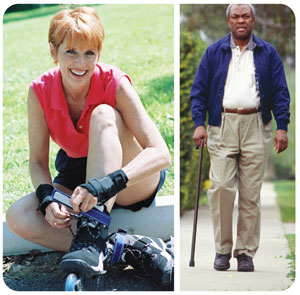
Hip, or Femoroacetabular impingement (FAI), is a condition where the bones of the hip are abnormally shaped. Because they do not fit together perfectly, the hip bones rub against each other and cause damage to the joint. It normally affects patients less than 45 years old.
In FAI, bone spurs develop around the hip ball and/or socket. The bone overgrowth causes the hip bones to hit against each other, rather than to move smoothly. Over time, this can result in the tearing of the labrum and breakdown of cartilage (osteoarthritis).
It is not known how many people may have FAI. Some people may live long, active lives with FAI and never have problems. When symptoms develop, however, it usually indicates that there is damage to the cartilage or labrum and the disease is likely to progress. Symptoms may include pain, stiffness, and limping. People with FAI usually have pain in the groin area, although the pain sometimes may be more toward the outside of the hip.
When symptoms first occur, it is helpful to try and identify an activity or something you may have done that could have caused the pain. Sometimes, you can just back off on your activities, let your hip rest, and see if the pain will settle down. Over-the-counter anti-inflammatory medicines (ibuprofen, naproxen) may help. If your symptoms persist, you will need to see a doctor to determine the exact cause of your pain and provide treatment options. The longer painful symptoms go untreated, the more damage FAI can cause in the hip.
Your Orthopaedic Clinic doctor will perform a physical exam and order imaging tests to help determine whether you have FAI. X-rays provide good images of bone, and will show whether your hip has abnormally shaped bones of FAI or arthritis. Occassionally, Computed tomography (CT) or MRI scans may be needed.
Non-surgical treatment includes activity changes, non-steroidal anti-inflammatory medications like ibuprofen, and physical therapy.
If tests show joint damage caused by FAI and your pain is not relieved by nonsurgical treatment, your doctor may recommend surgery. Many FAI problems can be treated with arthroscopic surgery. Arthroscopic procedures are done with small incisions and thin instruments. The surgeon uses a small camera, called an arthroscope, to view inside the hip. During arthroscopy, your doctor can repair or clean out any damage to the labrum and articular cartilage.
The hip specialists at The Orthopaedic Clinic are the only surgeons in the area performing hip arthroscopy. Give us a call if you would like a consultation or more information about this condition.
